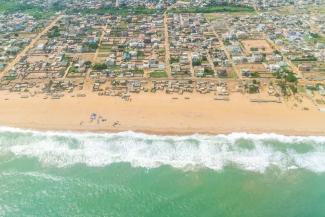Urban development
Feeling the heat

Coastal erosion is nothing new, of course, but it is becoming stronger. Cotonou, Benin’s commercial capital, is affected. Experts warned of catastrophe as early as 2000 unless vigorous action was taken immediately. Though the government has not been idle, the problems are growing.
The advance of the Atlantic Ocean has wreaked havoc on the coastal village of Djeffa, for example. It is situated halfway between Cotonou and Porto-Novo, Benin’s nearby political capital. The waves have washed away huts in which people lived. The shoreline has moved north by several dozen meters. Uncontrolled sand mining on the beach compounded the problem of course.
A new urban neighbourhood of Cotonou is being hit too. It is called PK 10. It is only a few kilometres away from the downtown area. Homes, hotels and beach resorts have been lost to the sea. The once popular Palm Beach Hotel, for example, collapsed. Many of the buildings still standing in PK 10 may be doomed as well. Experts reckon the sea level will rise by up to 60 centimetres in the next 20 years. Investments in the growing tourism industry, which the incumbent government has vowed to promote, are similarly under threat.
The challenges are huge. Embankments and other kinds of coastal protection must be fortified. Indeed, parts of Cotonou, a city with a population of more than 1.5 million, lie below sea level. Should there be violent floods, they could be submerged and possibly even wiped off the map.
The efforts made so far have proven insufficient. In 2008, the government launched a project to protect the coastline. It spent the equivalent of € 4 million on concrete barriers and levees along strategic parts of the coast. However, erosion has worsened nonetheless – and the trend was actually compounded by refurbishing and extension works at the Free Port of Cotonou. The harbour and its access routes were deepened.
In 2014, the government started more forceful efforts to protect the coast, building new levees near the Free Port. So far, € 70 million have been spent. In other places, measures are being taken at the local level. To really control erosion, however, much more needs to be done.
International action deserves consideration. Other coastal cities in West Africa face similar problems, including Lagos and Lomé. Important roads, including the one from Cotonou to Lagos, run along the shore. Massive flooding may thus disrupt vitally important traffic.
Infrastructure work in Lagos, moreover, may aggravate problems in Benin. The port facilities of Nigeria’s commercial hub are being expanded too. The good news is that donor institutions such as the World Bank have expressed readiness to provide the funding. On the other hand, it is obvious that action must be taken at the grassroots level everywhere. International schemes will only ever be as good as their local implementation.
Climate change is affecting urban life in other ways as well. Experts at Benin’s University of Abomey-Calavi say that weather patterns are changing in different ways in the various regions of Benin. Two common trends, however, are more heat and less precipitation. The rainy season has become unpredictable, and the intensity of precipitation has dropped by an alarming 50 % to 74 % in the past five years.
Crops have been lost, and domestically grown food has become rarer and more expensive on urban markets. Moreover, according to surveys by the University of Abomey-Calavi, meat and milk production has dropped, and previously unknown diseases are now affecting the health of livestock across the country. As consumers in Porto-Novo know, moreover, freshwater fish is becoming ever more costly and harder to find.
Part of the reason is that a local river in Porto-Novo is now clogged with invasive and obnoxious plants almost all year round. The vegetation is a potent fish repellent and makes it harder for fishermen to cast out their nets. Less rain, moreover, means that rivers’ water levels are lower than they used to be.
Karim Okanla is a lecturer at the Houdegbe North American University Benin in Cotonou.
karimokanla@yahoo.com







